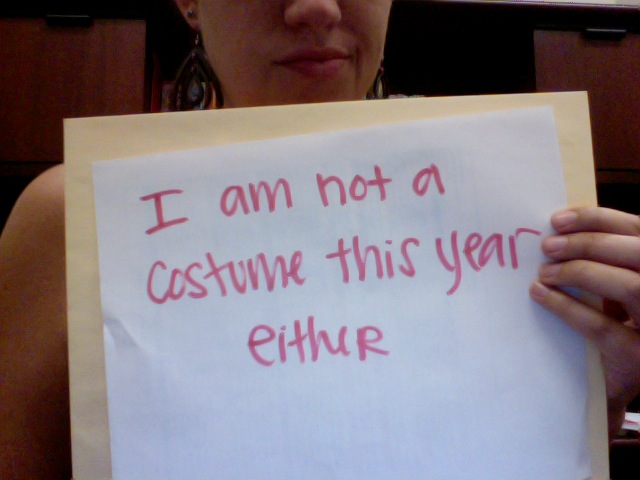 This post from Nativeappropriations.com is simply fantastic, and because it is a rhetorical analysis and because it addresses the ways bias and blind spots impact arguments, I am happy to be able to post about it here.
This post from Nativeappropriations.com is simply fantastic, and because it is a rhetorical analysis and because it addresses the ways bias and blind spots impact arguments, I am happy to be able to post about it here.In the post, Adrienne K. looks back at her 2011 post, Open Letter to the PocaHotties and Indian Warriors this Halloween. A post that made a lot of white people angry.
The 2011 letter opens with a salutation:
Dear Person that decided to dress up as an Indian for Halloween,This year, the original author annotated that salutation with this:
Ok, pretty basic start. Notice it doesn’t say “white person,” it doesn’t say “racist person,” just person.The 2011 letter continued:
I was going to write you an eloquent and well-reasoned post today about all the reasons why it’s not ok to dress up as a Native person for Halloween–talk about the history of “playing Indian” in our country, point to the dangers of stereotyping and placing of Native peoples as mythical, historical creatures, give you some articles to read, hope that I could change your mind by dazzling you with my wit and reason–but I can’t. I can’t, because I know you won’t listen, and I’m getting so tired of trying to get through to you.
 And that opening is what prompted me to write about this post on my blog. That frustration that Adrienne K.
And that opening is what prompted me to write about this post on my blog. That frustration that Adrienne K.is dealing with is too familiar: The knowledge that the person who you're trying to reach will resist in ways that defy reason and rhetoric. What's worse, Adrienne K. is dealing with that frustration while discussing a deeply personal issue - an issue tied to her identity and culture.
My interest in rhetoric and argument has always remained professional. I like to get fired up, but the privilege I inherited along with my race, gender, language, and birthplace makes it easy to keep my personal sphere out of the arguments I follow.
Adrienne K. annotated her introduction as well.
That’s 100% honest. The person that decided to dress up as an Indian probably isn’t going to listen to me. But those links actually *go* places. Places where you can read about why this is wrong. Where you can educate yourself. So if you read that paragraph and were like “oh crap, I don’t know any of this”–maybe now it’s time for you to click those. I’ll wait.I'm not going to pretend I have some deeper insight on this post. It's a great piece of writing, and I hope you go check it out.
No comments:
Post a Comment